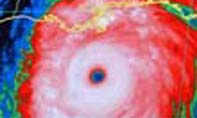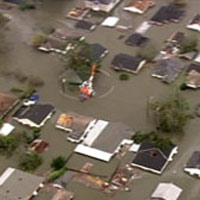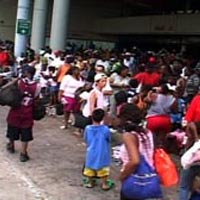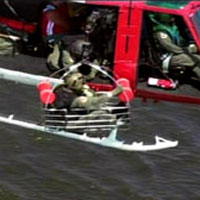- About Us
- Columns
- Letters
- Cartoons
- The Udder Limits
- Archives
- Ezy Reading Archive
- 2024 Cud Archives
- 2023 Cud Archives
- 2022 Cud Archives
- 2021 Cud Archives
- 2020 Cud Archives
- 2015-2019
- 2010-2014
- 2004-2009
 |
Ezy Reading: In the worst of times... the worst of human nature |
What a bizarre, tragic week in America's South.
The extent of the damage wreaked by Hurricane Katrina is still only now, several days after the event, becoming truly apparent, especially as tales of loss, desperation and survival gradually make their way from the mouths of those who were witness to the disaster on to the mainstream media.
 And yet in a buzz perhaps louder than even the Hurricane itself was capable of, we've now been faced with a veritable onslaught of finger-pointing, post-mortems and analysis of exactly where did things go wrong? Days ahead of Katrina reaching landfall the warnings were out across the country. This was potentially to be a storm for the ages, and one that could well unleash complete devastation throughout the gulf regions of Alabama, Louisiana and Mississippi. At peak, the Hurricane was blowing winds of up to 280 kilometres per hour. Post impact, the words 'total devastation' could not explain adequately what kind of chaos now presented itself to the survivors of these regions and, particularly, the city of New Orleans which was now almost completely under water. An area of the country almost as large as the entire United Kingdom was declared a Federal disaster zone.
And yet in a buzz perhaps louder than even the Hurricane itself was capable of, we've now been faced with a veritable onslaught of finger-pointing, post-mortems and analysis of exactly where did things go wrong? Days ahead of Katrina reaching landfall the warnings were out across the country. This was potentially to be a storm for the ages, and one that could well unleash complete devastation throughout the gulf regions of Alabama, Louisiana and Mississippi. At peak, the Hurricane was blowing winds of up to 280 kilometres per hour. Post impact, the words 'total devastation' could not explain adequately what kind of chaos now presented itself to the survivors of these regions and, particularly, the city of New Orleans which was now almost completely under water. An area of the country almost as large as the entire United Kingdom was declared a Federal disaster zone.
Initial relief assistance was slow, confusion, lawlessness and looting abounded, and without doubt, many who could have survived with emergency assistance perished as they awaited aid. Even at the time of writing, stranded residents are still being rescued, while others are still awaiting supplies of food and fresh water.
 In a post'September 11 era was this a harsh exposure of the Bush administration's hot air politics of assurance over substantive progress, or was this in fact an incident of such magnitude that no'one could have ever planned ahead for the degree of support and resources that would be needed to address the situation? Even as a mandatory evacuation order was issued for New Orleans, as well as other satellite townships, why were there little, if any reports of sandbagging and reinforcement of the New Orleans levies taking place? Where were the transport means available to evacuate those who couldn't escape without support? Why would it take this tragedy to finally convince to Federal Government, after years of requests, that those New Orleans levies needed to be reinforced? And why, especially as word of theft, rape, dehydration, lack of police support and continued casualties, did it take so long for the military to be called in en masse to take control of the situation? Were the layers of bureaucratic red tape and which had, again, been brought to bear after September 11 still so thick and unwieldy? Open to the editorial page of any American newspaper today, listen to any radio talk'show host or television newscaster, and these questions are being asked over and over again.
In a post'September 11 era was this a harsh exposure of the Bush administration's hot air politics of assurance over substantive progress, or was this in fact an incident of such magnitude that no'one could have ever planned ahead for the degree of support and resources that would be needed to address the situation? Even as a mandatory evacuation order was issued for New Orleans, as well as other satellite townships, why were there little, if any reports of sandbagging and reinforcement of the New Orleans levies taking place? Where were the transport means available to evacuate those who couldn't escape without support? Why would it take this tragedy to finally convince to Federal Government, after years of requests, that those New Orleans levies needed to be reinforced? And why, especially as word of theft, rape, dehydration, lack of police support and continued casualties, did it take so long for the military to be called in en masse to take control of the situation? Were the layers of bureaucratic red tape and which had, again, been brought to bear after September 11 still so thick and unwieldy? Open to the editorial page of any American newspaper today, listen to any radio talk'show host or television newscaster, and these questions are being asked over and over again.
Perhaps this is a natural, understandable result of any tragedy. We inherently always want to know 'why?' It happened after September 11, it happened after the cataclysmic tsunami of late 2004, and it is again happening now. And these questions do need to be answered. If there are people to blame, then solutions must be found to ensure such grave errors are never repeated.
 However it is a mere seven days since Hurricane Katrina first roared into the American South. So long as there are people who are still missing, in need of rescue, displaced, and at a loss, the focus should be upon action now rather than analysis and news conferences. The only screaming drowning out those who are suffering, should be the calls of men and women demanding immediate action over talk, forecasting, and bitter speculation. There will be more than enough time to assess the situation in days to come.
However it is a mere seven days since Hurricane Katrina first roared into the American South. So long as there are people who are still missing, in need of rescue, displaced, and at a loss, the focus should be upon action now rather than analysis and news conferences. The only screaming drowning out those who are suffering, should be the calls of men and women demanding immediate action over talk, forecasting, and bitter speculation. There will be more than enough time to assess the situation in days to come.
The question for now is 'What can we do to help at this exact moment?'
Tomorrow we can deal with 'Why?'
To help the victims of Hurricane Katrina, make your donations at www.redcross.org
Ezy Reading is out every Monday.
